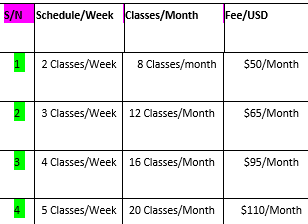PRESENT TENSE PARTICLES IN ARABIC LANGUAGE (2) (أدوات جزم الفعل المضارع)
By: Yusuf Basirat Bolanle
In our previous lesson, we have discussed the definition of the present tense in the Arabic Language. We also discussed the particles of the present tense in Arabic Language, most especially the Nazb particles which give the end of the present tense a fatha parsing mark instead of the initial Ad-dammah.
In today’s lesson, we shall discuss the Jazm particles of the present tense, a condition whereby the present tense takes as-sukun parsing mark instead of the initial ad-dammah, and we shall give examples to illustrate our explanation.
The Present Tense takes Jazm sign, which is as-sukun, if it is proceeded by one of the particles of Jazm. These particles are:(لم), (لا), and (إن).
Meaning of Jazm
Jazm is given the end of the present tense a parsing mark “As-Sukun” instead of the initial parsing mark which is Ad-dammah. When a present tense is preceded by any of the Jazm particles, it automatically changes the parsing mark on its end from Ad-dammah to As-sukun.
(لم) and (لا): These two particles give only one
Present Tense Jazm sign. The first one is negating the
occurrence of an action in the past while the second one rejects the occurrence
of the action to
be performed by the second person.
However, the (إن) gives
two present tense jazm parsing mark at a time, and the
occurrence of the first verb is the condition for the occurrence of the second
verb preceded by (إن)
Now, let us give a brief explanation of each of the Jazm particles with examples.
Lam (لم)
The first of these Jazm particles is (لم). Lam means “Did not” or “didn’t” it is used to express the action which has not been done in the past.
Examples are the following.
لم يَقْرأْ يوسف درسَه
Yusuf did not read his lesson
لم أجلس على الكرسي اليوم
I did not sit on the chair
لم تكتب راضية الامتحان
Rodiyah did not write the exam
لم يسافر أبى
My father did not travel
لم نسمع إلى الخبر
We did not listen to the news
In the above examples, the verbs (يقرأ), (أجلس), (تكتب), (يسافر), and (نسمع) are all present tense, they all end with the parsing mark As-sukun because they were preceded by Jazm particle (لم).
However, the jazm particle (لم) as mentioned in the sentences indicates the negation of the occurrence of an action in the past form or denying the occurrence of an action in the past.
Laa (لا)
The second of the Jazm particle of the present tense is (لا), which means “Do not” or “don’t”. It is usually refers to as (لا الناهية), the negative Laa. It indicates the negation of an action to be performed by the second person in the present time. This occurs when the speaker (the first person) tells the listener (the second person) not to do or perform a particular action.
Examples
لا تجلس على الكرسي
Do not sit on the chair
لا تأكل الطعام و أنت واقف
Do not eat the food while you are standing up
لا تقرب الصلاة وأنت سَكْرَانُ
Do not perform prayer while you are drunk
لا تشرب الماء الأن
Do not drink water now
لا تذهب الى الميدان
Do not go to the field
If
we go through the above examples, we discover that the verbs (تجلس), (تأكل), (تقرب), (تشرب), and (تذهب) are
all present tense with the parsing marks As-sukun on their end. This is due to
the Jazm particle (لا) that
preceded them.
Also, if we look at the function of the Jazm particle (لا) as
used in those sentences,
we discover
that it is
negating the occurrence of an action to be done by the second
person.
In (إن)
The third of the Jazm Particles of the present tense is In (إن) which means “If”. It is called a conditional Jazm particle because it gives condition on the action to be performed likewise the result of such action if it is performed.
Examples
إن تجلس على المفعد، أجلس معك
If you sit on the bench, I will sit with you
إن يسافر أبى، أسافر معه
If my father travels, I will travel with him
إن تضرب أخاك، يضربك عمك
If you beat your brother, Your uncle will beat you
إن تقرأ القرأن، يفتح الله قلبك للحق
If you read Quran, Allah will open you heart to
the truth
إن تسمع نصيحة والدك، تنجح فى
الإمتحان
If you listen to your father’s advice, you will succeed in the exam
In all the sentences above, the present tense are all conditional present tense with the results of each action if it is performed.
Each
sentence consists of
two present verbs and each
of them ends with Jazm sign. The occurrence
of one the these verbs is a condition for the occurrence
of
the second one. That is
why the (إن)
particle is regarded as a conditional Jazm
particle.
The first verb is known as the “Conditional Verb” while the second one is “Conditional Result Verb”
Summarily, The present tense takes As-sukun on
its end if it is preceded by
one of the Jazm
particles of the present tense. however, if these particles are removed, it
ends with
initial Ar-raf’u sign
which is Ad-dammah.
Jazm is
given the end of the present tense as-sukun
parsing mark instead of the initial ad-dammah.












0 Comments